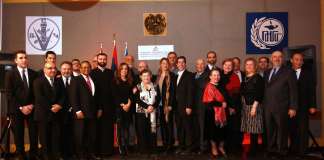Canada’s ministry of foreign affairs is closely following the events in Nagorno-Karabakh, and is concerned about the dramatic deterioration of the humanitarian situation as a result of last year’s events. Andrew Turner, the first resident ambassador of Canada to Armenia, said this in his opening remarks at the discussion on border security between Armenia and Azerbaijan at the foreign affairs and international development committee of the Canadian House of Commons.
Canada has joined the Armenian government’s call for help. Canada has announced a total of $3.9 million in humanitarian aid to support refugees from Nagorno-Karabakh through humanitarian organizations, Turner said.
Canada has consistently called for non-use of force, and has called on all parties to participate in negotiations to reach a comprehensive peace agreement. Canada supports the principles of non-use of force, the territorial integrity of both countries, and the right to self-determination. The peace agreement must now also guarantee the displaced population’s right to return to Nagorno-Karabakh and respect for their property and rights, the ambassador added.
MP Stephane Bergeron asked Turner a question about the possibility of imposing sanctions on Azerbaijan, to which the ambassador quoted Canadian FM Melanie Joly’s words that the matter of sanctions is on the table.
If necessary, they will be imposed, but we avoid it and try to solve the problem diplomatically. Furthermore, we are making preparations for Canada to become the first non-EU country to participate in a monitoring mission to see what is happening at the border. We are also working with our allies to convey our message clearly to Baku, that territorial integrity must be respected, Turner added.
Responding to the ambassador, Bergeron noted that Canada imposed sanctions against Russia for its invasion of Ukraine, and in 2021, Azerbaijan invaded and occupied a part of the sovereign territory of Armenia.
Since the conflict has been going on for more than 30 years, there is no clear information about the borders of the two countries, so we expect that such issues will be resolved through a peace agreement, including the preservation of homes and cultural treasures. Canada supports these efforts, Ambassador Turner responded.
MP Heather McPherson asked the ambassador in which case the sanctions will be considered more seriously.
According to the ambassador, negotiations on sanctions with the allies are already underway, but as long as the Armenian government has the impression that the peace process can be moved forward, Canada would not want to take any steps to hinder those efforts.
MP Sameer Zuberi asked the ambassador whether Armenia petitioned with a request to impose sanctions against Azerbaijan.
No, responded Turner, and noted that there is a dispute within Armenia at the moment regarding the application of sanctions. There have been calls for support and concrete action, but there is a clear understanding that the main focus must be on achieving an agreed peace agreement, he noted.
The ambassador added that no country has yet followed the path of sanctions, but France announced the provision of military aid to Armenia, as a result of which Azerbaijan refused to participate in international meetings that could contribute to the peace process.
Of course, we don’t know if those meetings would be useful or not, but this step gave Azerbaijan a reason not to participate. Thus, such steps, including the threat of sanctions, can be a reason for some parties not to participate in peace talks concluded the first resident ambassador of Canada to Armenia.














